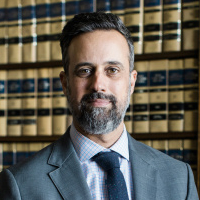 Vallejo Criminal Lawyers, California
Vallejo Criminal Lawyers, California
Sponsored Lawyers
1-10 of 35 matches
Criminal, Felony, Personal Injury
When the legal system fails you, you can’t leave yourself or your child at the mercy of a judge and 12 jurors. Seth Morris has saved his clients from the grasp of the system time and time again by securing dismissals and no-time deals on murder cases and people facing life in prison.
(more)Estate Planning, Workers' Compensation, Insurance, Products Liability, Criminal
Stephen Healy has practiced law for over 27 years, now focusing his practice on asbestos compensation claims and asbestos civil litigation in state and federal court. Attorney Healy has represented many individuals that worked in mills or factories, or are military veterans who worked in environments that exposed them to asbestos. Attorney Healy is licensed to practice law in the States of California and Nevada, and is also accredited by the United States Department of Veterans Affairs to represent veterans when they file for service connected disability benefits.
(more)





